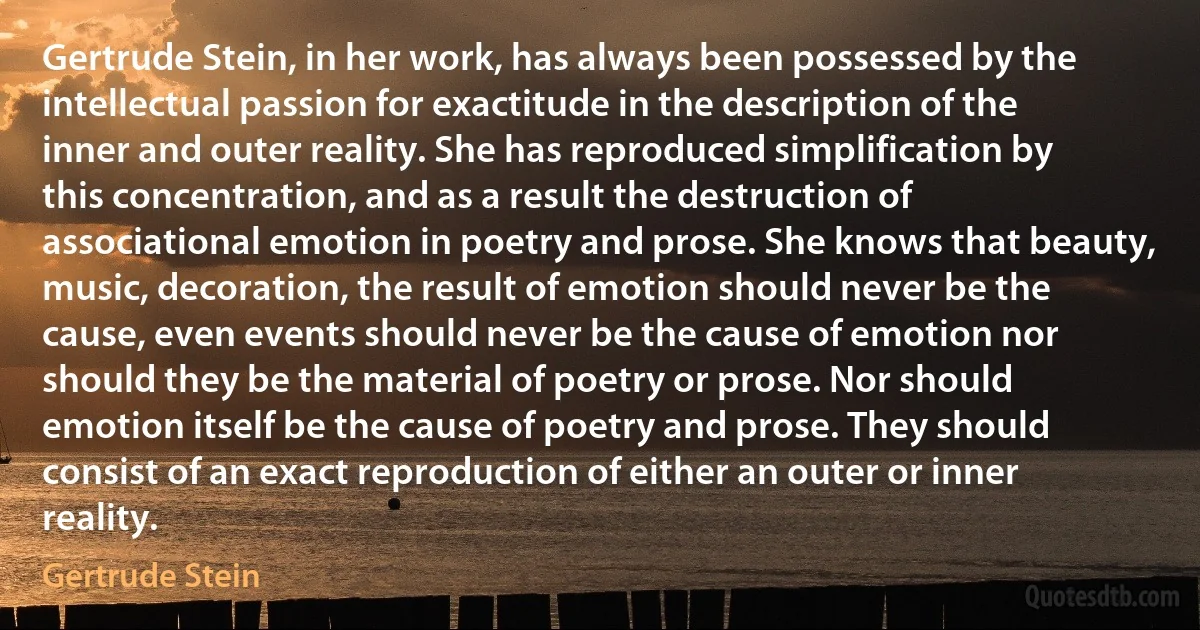
Gertrude Stein, in her work, has always been possessed by the intellectual passion for exactitude in the description of the inner and outer reality. She has reproduced simplification by this concentration, and as a result the destruction of associational emotion in poetry and prose. She knows that beauty, music, decoration, the result of emotion should never be the cause, even events should never be the cause of emotion nor should they be the material of poetry or prose. Nor should emotion itself be the cause of poetry and prose. They should consist of an exact reproduction of either an outer or inner reality.
Gertrude SteinRelated topics
beauty cause concentration description intellectual music nor passion reproduction result should simplification stein work exactitudeRelated quotes
Generally speaking, an Indian university must regard itself as one of the living organs of national reconstruction. It must discover the best means of blending together both the spiritual and the material aspects of life. It must equip its alumni irrespective of caste, creed or sex, with individual fitness, not for its own sake, not for merely adorning varied occupations and professions, but in order to teach them how to merge their individuality in the common cause of advancing the progress and prosperity of their motherland and upholding the highest traditions of human civilisation.

Syama Prasad Mookerjee
If... God highly exalted Christ because He humbled Himself, suffered dishonour, was tempted and endured a shameful cross and death for our sake, how will He save, glorify and raise us up if we neither choose humility, nor show love to our fellows, nor gain our souls by enduring temptation (cf. Lk. 21:19), nor follow the saving Guide through the 'strait gate' and along the 'narrow way' leading to eternal life (Mt. 7:14)? To this end we were called, says Peter, the chief Apostle, ' Because Christ also suffered for us, leaving us an example that we should follow His steps' (I Pet. 2:21).

Gregory Palamas
Do not do anything without signing yourself with the sign of the Cross! When you depart on a journey, when you begin your work, when you go to study, when you are alone, and when you are with other people, seal yourself with the Holy Cross on your forehead, your body, your chest, your heart, your lips, your eyes, your ears. All of you should be sealed with the sign of Christ's victory over hell. Then you will no longer be afraid of charms, evil spirits, or sorcery, because these are dissolved by the power of the Cross like wax before fire and like dust before the wind.

Cleopa Ilie
Comprehension is neither an arbitrary act nor a passive experience, but a responsible act claiming universal validity. Such knowing is indeed objective in the sense of establishing contact with a hidden reality; a contact that is defined as the condition for anticipating an indeterminate range of yet unknown (and perhaps yet inconceivable) true implications. It seems reasonable to describe this fusion of the personal and the objective as Personal Knowledge. Personal knowledge is an intellectual commitment, and as such inherently hazardous. Only affirmations that could be false can be said to convey objective knowledge of this kind.

Michael Polanyi
As opposed to [megatechnics], an organic system directs itself to qualitative richness, amplitude, spaciousness, free from quantitative pressure and crowding, since self-regulation, self-correction, and self-propulsion are as much an integral property of organisms as nutrition, reproduction, growth, and repair. Balance, wholeness, completeness, continuous interplay between inner and outer, the subjective and the objective aspects of existence are identifying characteristics of the organic model; and the general name for an economy based on such a model is an economy of plenitude.

Lewis Mumford
